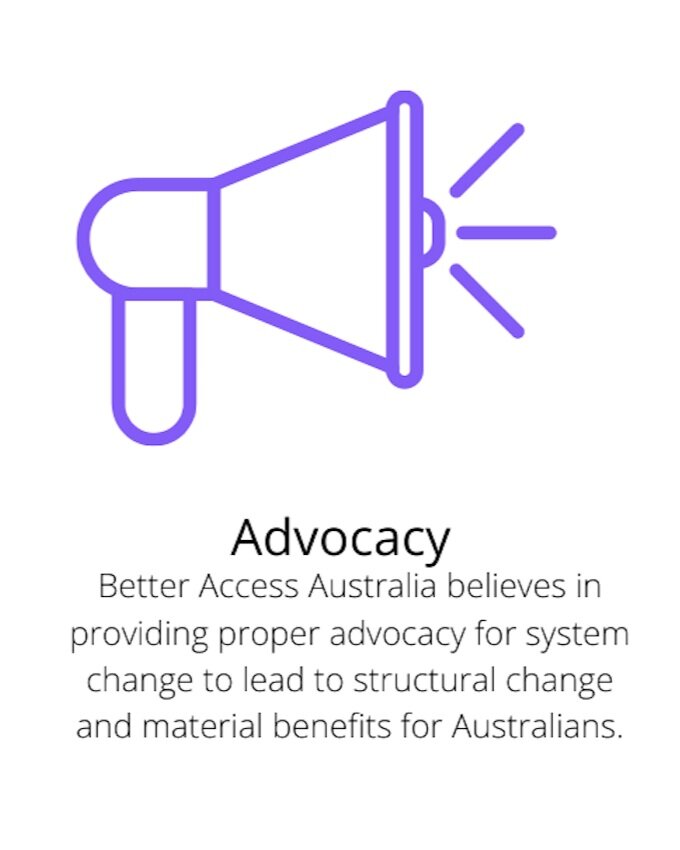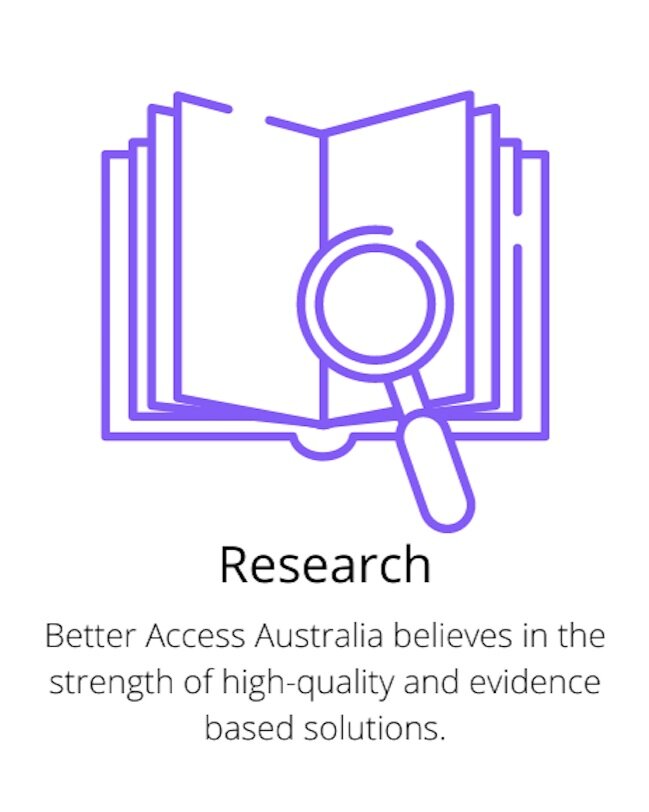
Better Access Australia
Better health, disability and social services.
Better Access Australia calls for major reforms of health and disability services systems in 2024-25 Budget Submission
Our Mission
We are a not-for-profit organisation striving for improvements in health, disability, and social services to achieve better access and continuity of care for all Australians by 2030.

As the summary of our budget submission below highlights, Better Access Australia is seeking reforms that provide a fairer distribution of government support to those that need it most. We’re asking those that are financially assured to do more and asking for the system to embrace scope of practice reform to prioritise access to healthcare in a system crippled by workforce shortages. Most importantly we once again ask that the Government be held to account for their promise on newborn screening and the royal commission on COVID19.
1. National Newborn Screening Program for 80 diseases NOW
On 2 April 2022 the Prime Minister promised to make Australia a world leader in newborn bloodspot screening again, committing to a truly national program screening for 80 diseases and one that ended the postcode lottery. Not one new disease has been added to the program nationally since this commitment was made.
Only a handful of new diseases have been considered by MSAC and the National Committee of Health Ministers has re-committed to the status quo. Time to make it a national program under the MBS and deliver what was promised.
Everyday 5 babies are going home without the lifesaving and lifechanging diagnosis they need and the access to the medicines and support services available right now on the Pharmaceutical Benefits Scheme (PBS), Life Saving Drugs Program (LSDP) and National Disability Insurance Scheme (NDIS).
THIS IS A BROKEN PROMISE THAT NEEDS TO HONOURED
2. Improve subsidy and access to contraceptive health on the PBS
We need an urgent review of contraceptive medicines available on the Pharmaceutical Benefits Scheme (PBS), with a plan for improving subsidised access to modern contraceptives by 1 July 2025. Did you know that 1 in 10 women in Australia suffer from Polycystic Ovarian Syndrome (PCOS), and that number increases to 1 in 5 for First Nations women. Women need affordable access to modern contraceptives, not just to manage their reproductive health, but to reduce their cancer risk. Most contraceptives subsidised on the PBS are old technology and do not meet the health needs of Australian women.
Women’s’ pain is regularly dismissed and devalued as lived experience, 'it's just part of being a woman’. The majority of migraine sufferers are also women, and access to modern migraine treatments on the PBS was subject to one of the longest delays to access. The list of women's health issues being marginalised goes on and on.
This cost-of-living inequity has to stop.
Pricing compromise by government and the industry will be required, but enough is enough… stop playing games with women’s health.
3. Establish #100 days to listing KPIs for all healthcare treatments
(A) Introduce KPIs of 100 days for subsidised access to medicines, diagnostics and medical devices to drive a change in the processes for evaluation, contracting and funding between government and industry putting patients first. This cannot be limited to first in class first use treatments as it will continue the exclusionary practices leading to average listing times of #820days for medicines and their indications.Reintroduce the secretariat listing processes on the PBAC to achieve these targets when new indications are added to the ARTG, with 100% rebated Risk Share Arrangements and automatic price reductions applied under a published and transparent formula as pre-agreed with the industry under their next Strategic Agreement with different formulas reflecting variations in chronic and acute disease and longevity of treatment cycles.
(B) Reintroduce the secretariat listing processes on the PBAC to achieve these targets when new indications are added to the ARTG, with 100% rebated Risk Share Arrangements and automatic price reductions applied under a published and transparent formula as pre-agreed with the industry under their next Strategic Agreement with different formulas reflecting variations in chronic and acute disease and longevity of treatment cycles.
(C) Consider using the post market review process for all medicines, devices and diagnostics listings to achieve the #100days with changes in scope of practice of the PBAC and MSAC to deliver against this outcome alongside new risk share arrangements
4. Improve affordability of medicines on the PBS for Government
(A) Cease price disclosure and replace with annual price cuts for medicines that go off patent and are subject to brand competittion. This would address the inequity in current pricing for some biologicals and achieve savings faster and with less administrative burden and cost to government and industry.
(B) Tender for teo-product availability of biosimilars of each molecule in Australia.
(C) Introduce a cost minimisation minus policy for new entrants in F1 recognising that market competition should drive better pricing – it if works for big screen TVs it should also work for medicines. 5, 10 and 15 year price cuts should remain in place for those molecules where no ‘me too’ has triggered a cost-minimisation minus price cut.
(D) This policy could be applied retrospectively for improved savings to fund #100days listings.
(E) Remove the Community Service Obligation payment to wholesalers and instead provide the funding to pharmacists in rural and remote Australia to manage their own stock requirements. This would encourage better stock management, reduce the need for daily deliveries and lead to an overall reduction in the cost of the CSO. With wholesalers now major multinationals the subsidy to these companies needs to be questioned.
5. Recognise protective and cost reducing effect of Immunisation (especially in adults)
The National Preventive Health Strategy 2021-30 noted that “Moving forward, immunisation will need to evolve from a focus on infants and children to vaccinating along the life course – including the need for improved data amongst these cohorts.” (p.62)
Australia has conducted an internal review of the national Immunisation program with no community consultation.
Community engagement is essential noting shortfalls in the current Shingrix® eligibility for immunocompromised people, meningococcal vaccines access and the postcode lottery access to Beyfortus® for RSV.
We need a comprehensive program for adult vaccination that one that recognises the value of vaccines to our health and our health system. lets not just learn the lessons from COVID-19 but apply them too.
6. Improve patient access to healthcare professionals in primary setting
(A) End costs to patients and government of unnecessary annual specialist referrals for long-term chronic disease care.
(B) Recognise the capacity and cost-effectiveness of greater use of nurses and pharmacists in the delivery of primary care services to improve timeliness of care, and affordability of care for patients and the health system. They need to be MBS recognised and PBS recognised.
(C) Expanded scope of practice should include expanded prescribing rights for common medicines accompanied by FULL PBS subsidy. Pharmacists should not be able to prescribe and dispense in the same transaction with the exception of opiate dependence treatments.
(D) There is a desperate shortage in access to opiate dependence treatment practitioners. We need to allow pharmacists to be prescribers of opiate dependence treatments with the right to prescribe and dispense for subsidy in the same transaction and be MBS recognised for their services.
(E) Allow online Australian- based medical services to write PBS-eligible scripts but with private consultation costs (non-MBS) to remain.
(F) Allow allied health and nurse practitioners to refer to for MBS-covered specialists and diagnostics
(G) Accept the place and access potential of Private Health Insurance in Australia’s healthcare system and allow private health to cover out of pocket costs in the primary care setting, consistent with the mental health funding model. This should include GPs, nurse practitioners and pharmacist-supported services.
7. Make our federal health system genuinely transparent and accountable to the community
(A) Make PBS and MBS decision-making accountable to the community by making all subsidy decisions eligible for review under the new Administrative Review Tribunal.
(B) Improve operations of the Freedom of Information (FOI) Act 1982, with higher standards of access legislated, greater penalties for agencies that obfuscate, and delay access supported by a significant injection of funds to improve the services of the Australian Office of Information Commissioner (AOIC).
(C) Commence the election-promised Royal Commission into Australia’s response to COVID-19 pandemic at all levels of Government. The current health internal review is devoid of power and independence. This is the one RC we need so that lessons learned and can be applied to to future preparedness economically, socially and for our health system.
(D) Establish a compensation fund for the Opiate Dependent Treatment Program patients who were charged unlawful fees to access their PBS medicines prior to 1 July 2024. These patients deserve compensation for the tens of thousands of dollars government compelled pharmacies to charge patients to access these PBS-funded life saving treatments.
8. Better target Government subsidies to those who need them most
(A) Reduce the family income eligibility cutoff for childcare subsidies from $530,000 to $265,000. Financial support for those that need it most. Use these savings for other social services.
(B) Introduce means testing for the NDIS consistent with other government subsidy programs, noting current thresholds for MBS and PBS concessional status eligibility and safety net protections.
(C) Introduce a third-tier PBS copayment of $15.00 to make medicines more affordable for families earning less than $150,000 but more than the concessional cut-off threshold. Increase the new maximum general PBS co-payment by a one-off 10% increase to partially offset this reform.
(D) Freeze indexation on PBS co-payments for a period of three years until inflation is under control.
(E) Automate the PBS safety net as per the MBS safety net so patients do not have to apply and track their medicines usage. Offset this be a reduction in the safety net recording fees paid to pharmacists.
(F) Make 60-day scripts with 5 repeats the default in prescribing and dispensing software.
(G) Refocus urgent care clinics funding into all GP clinics that wish to provide extended hours services at reduced or bulk billing rates. Stop the marketplace distortion.





Your voice is important.
Do you have a story to share?
Better Access Australia wants to hear consumer voices. Whether that be your experience with newborn screening, or lack thereof.
Have you struggled navigating health, disability or social service system?
We want to hear from you.
No voice is too small.
No one’s story is unimportant.
Our Organisation
Join Better Access Australia on social media!

